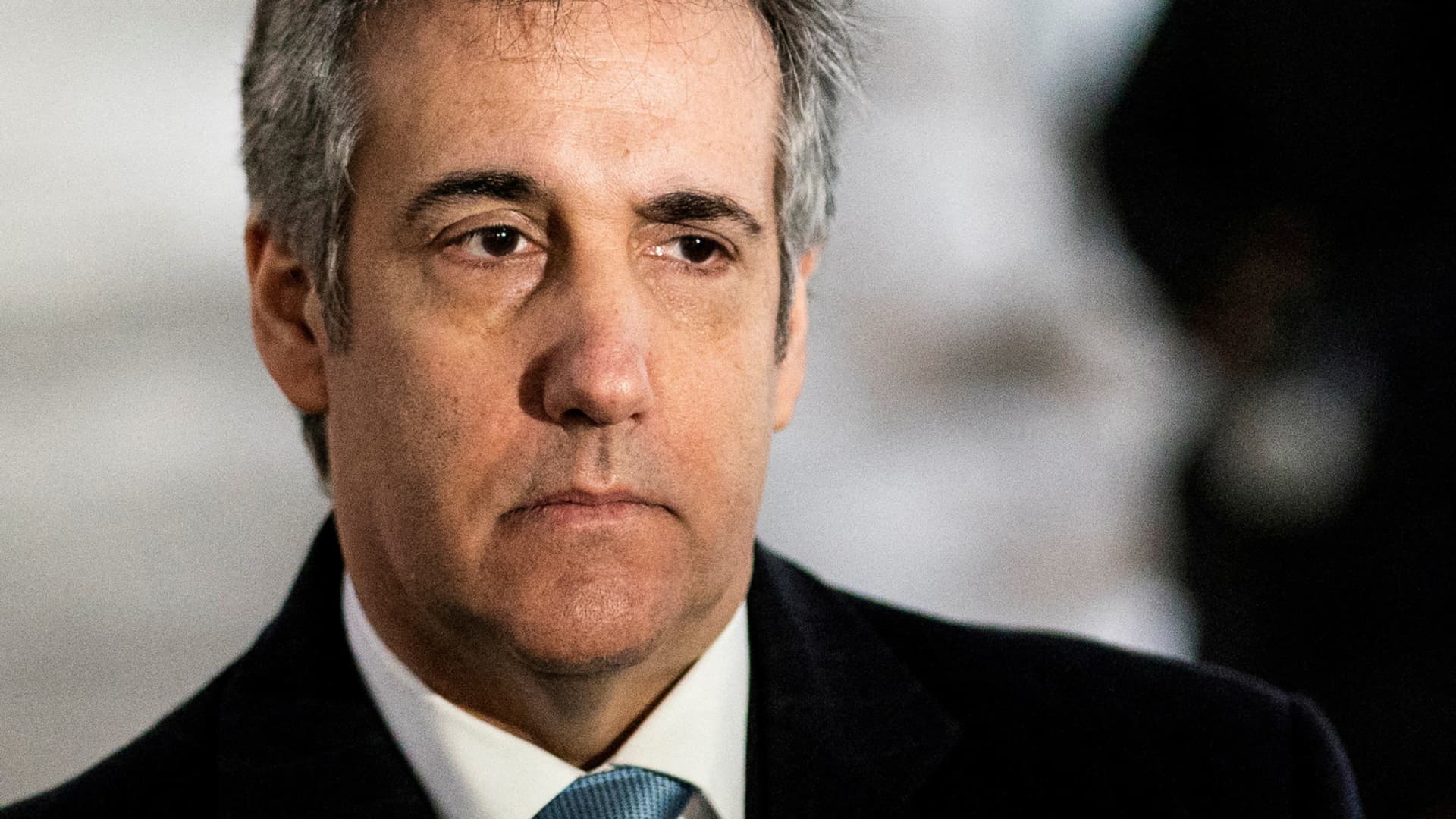Michael Cohen testified Monday he feared there would be a “catastrophic” effect on the 2016 presidential campaign of Donald Trump if porn star Stormy Daniels went public with her claim of having sex with the billionaire real estate mogul a decade earlier.
Latest Trump trial update: Jury to rehear David Pecker testimony on second day of deliberations
Cohen said Trump was very angry to learn that Daniels was again shopping around her account, five years after his then-personal lawyer and fixer Cohen first notified Trump about the potential story becoming public.
” ‘I thought you took care of this,’ ” Trump said, Cohen testified Monday in Manhattan Supreme Court at Trump’s criminal hush money trial. ″ ‘I thought this was under control.’ “
Trump then said, ″ ‘This is a disaster, a total disaster. Women will hate me,’ ” the 57-year-old Cohen testified.
” ‘Guys will think it’s cool, but this is going to be a disaster for the campaign!’ ” Trump fumed, according to Cohen.
Cohen noted that at the time that he learned Daniels might sell her story of a one-night stand with Trump, the then-Republican nominee Trump “was polling very poorly with women.”
“And this, coupled with the previous Access Hollywood tape” made Trump upset, Cohen testified, referring to the infamous recording that captured Trump boasting of kissing women and grabbing their genitals without prior consent.
Earlier Monday, Cohen testified that Trump had warned him that “just be prepared, there’s going to be a lot of women coming forward,” once he announced that he was running for president in 2015.
Cohen also testified about secretly recording Trump during a meeting about reimbursing the publisher of The National Enquirer for making a $150,000 hush money payment to a Playboy model to buy her silence about an alleged affair with Trump.
Pay with cash,” Trump says on that recording. The publisher ended up not being reimbursed.
Cohen’s revelations came on his first day of testimony at Trump’s New York criminal hush money trial, where he detailed efforts to protect Trump’s presidential campaign in 2016 from being harmed by salacious disclosures.
Once slavishly devoted to Trump, Cohen is now his avowed enemy and could be the key witness against him in the case.
Cohen paid Daniels $130,000 shortly before the 2016 presidential election, in exchange for her silence about Trump.
When a prosecutor asked him if he would have paid Daniels without getting a “sign-off” from Trump, Cohen said no.
“Because everything required Mr. Trump’s sign-off,” said Cohen, who also said, “I wanted my money back.”
Trump said, “Good, good,” when Cohen informed him he had paid Daniels, Cohen testified.
“Don’t worry, you will get the money back,” Trump also said, according to Cohen.
Trump’s reimbursement of Cohen for that payoff while he was serving in the White House is the basis for the Manhattan District Attorney’s case against the ex-president.
The Trump Organization reported the Daniels-related reimbursements, which ended up totaling $420,000 over 12 months, to Cohen as legal expenses.
But District Attorney Alvin Bragg alleges that this constituted a crime — falsification of business records — committed by Trump to hide the fact that the hush money had protected his then-wobbling presidential candidate at a key moment.
Trump, who denies having sex with Daniels, says the felony charges are bogus. The presumptive Republican presidential nominee calls them an effort by a Democratic prosecutor to damage his chances to win the upcoming election against President Joe Biden.
Trump’s lawyers have suggested he had Cohen pay off Daniels because he was worried about the effect on his family, particularly his wife Melania, if the adult film actress went public with her story about having sex with Trump months after Melania Trump gave birth to the couple’s son Barron.
Cohen testified that at one point during discussions about the hush money situation he asked Trump “How things gonna go upstairs?” a reference to Melania Trump.
Donald Trump replied, “Don’t worry. How long do you think I’ll be on the market for? Not long,” Cohen testified.
In addition to making the payment to Daniels, Cohen was closely involved in the arrangement of the other hush money payment that is a key element of the case, to Playboy model Karen McDougal by the publisher of the National Enquirer in 2016 in exchange for her story of an affair with Trump.
Cohen testified that as Trump moved to announce in 2015 that he would make a run for the White House, it became clear that the married real estate mogul factored in his secret personal life.
“Did Mr. Trump express any concerns about negative stories about his personal life?” assistant District Attorney Susan Hoffinger asked Cohen, as Trump sat at the defense table.
Cohen replied, “Yes.”
“What did he say?” Hoffinger asked.
Cohen answered that Trump said, ” ‘You know that when this comes out, meaning the announcement, just be prepared, there’s going to be a lot of women coming forward.’ ”
As Cohen began testifying Monday, telling jurors about his personal and professional background, Trump listened with his eyes closed, in the same way that he had done when other witnesses in the case took the stand.
“During the time you worked there for Mr. Trump, how often would you say you met with him or spoke with him,” Hoffinger asked Cohen.
Cohen replied, “Every single day, and multiple times a day.”
He told the prosecutor that working for Trump over a decade “was an amazing experience in many ways.”
“There were great times and some not great times, but for the most part, I enjoyed the responsibilities given to me, I enjoyed my colleagues, the Trump children,” Cohen said, as Trump’s son Eric Trump stared intently at him from the courtroom gallery.
“It was a big family.”
Cohen later detailed how he used to encryption app Signal to communicate with David Pecker, the then-CEO of American Media, the publisher of the National Enquirer, and Pecker’s lieutenant Dylan Howard.
Cohen said he used Signal when it “was a sensitive matter we wanted to keep private.”
He testified that in August 2015, Trump and Pecker met, and “What was discussed was the power of the National Enquirer being at the cash register of so many supermarkets and bodegas that if we could place positive stories about Trump that would be beneficial and if we could place negative stories about some of the other candidates, that could be beneficial.”
Cohen said that Pecker offered to alert Trump to any potentially negative stories about Trump so that he could stop them from being published.
In June 2016, Pecker and Howard alerted Cohen to the fact that the Playboy model McDougal was interested in selling her account of an affair with Trump to news outlets, Cohen testified.
Cohen said the impact from McDougal going public with her story could be “significant,” and that he “immediately” notified Trump after hearing from American Media about it.
“She’s really beautiful,” Trump said of McDougal when Cohen told him what Pecker and Howard had said.
“OK, but she’s shopping a story,” Cohen replied, according to his testimony Monday.
Trump then asked his fixer to see that McDougal’s account was not published, Cohen testified.
Cohen then substantiated Pecker’s previous testimony in which he told Trump it would cost $150,000 to “control” McDougal’s story.
“No problem, I’ll take care of it,” Trump told Pecker, according to Cohen.
But Trump did not pay back Pecker, which angered the publisher, Cohen testified.
During one restaurant meeting, Pecker told Cohen, “I need my money back,” Cohen testified.
“I said, ‘Mr. Trump said he will pay you back and he will pay you back,’ ” Cohen testified.
Cohen said he later told Trump he was concerned about a file American Media had on Trump.
“And one of the concerns that I had, that I expressed to Mr. Trump, was that if he [Pecker] goes, there’s a series of papers there that relate to you,” Cohen testified.
Hoffinger asked: “Was Mr. Trump concerned about that?”
“Yes,” Cohen replied.
He then said he recorded a conversation with Trump in September 2016 about buying the rights to McDougal’s life story.
Cohen said he secretly taped Trump “so I could show it to David Pecker, and that way he would hear the conversation, that he was going to be paying — that he was going to be paying him back.”
“And I also wanted him to remain loyal to Mr. Trump,” Cohen testified.
The recording of Cohen and Trump’s conversation was then played for jurors.
“What I was doing, I was doing at the direction of and for the benefit of Mr. Trump,” Cohen said of his involvement in getting Amerian Media to buy McDougal’s story.
Pecker and Howard also ran negative stories in the Enquirer about Trump’s GOP primary opponents, the senators Ted Cruz and Marco Rubio, and about Hillary Clinton, the Democratic presidential nominee in 2016.
“Some of the negative ones that I received from David or Dylan was Hillary Clinton wearing thick glasses allegations that she had a brain injury, Ted Cruz photo of his father with Lee Harvey Oswald claiming he was involved in the assassination of JFK, articles about Marco Rubio in swimming pool with several men, that he was having a drug binge of some sort,” Cohen testified.
“AMI [American Media] would send over the cover story and I would show it to Mr. Trump and he knew David was loyal and on board and doing everything that he said he would do at the August meeting and he was actually doing it.”
Hoffinger asked Cohen if he recalled Trump’s reaction to those stories.
“That’s fantastic, that’ unbelievable,” Trump said, according to Cohen.
Cohen, who in the past has said he had a “blind loyalty” to Trump while working for him, is expected to testify for several days.
After Hoffinger finishes her first round of questioning, Trump’s defense lawyer Todd Blanche will cross-examine Cohen.
Blanche is expected to hammer away at Cohen’s self-admitted history of lying — often in the service of Trump — and his federal criminal guilty plea to tax crimes and campaign finance violations in connection with the Stormy Daniels hush money payment.
“He’s a convicted felon. And he also is a convicted perjurer. He is an admitted liar,” Blanche said in his opening statement about Cohen at the start of the trial.
A number of prominent Republican supporters showed up at court Monday to support Trump, including two U.S. senators, J.D. Vance of Ohio and Tommy Tuberville of Alabama, Rep. Nicole Malliotakis of New York, and two state attorneys general, Steve Marshall of Alabama and Breanna Bird of Iowa.
“What’s going on inside that courtroom is a threat to American democracy,” Vance told reporters
On Friday, Blanche asked Judge Juan Merchan to slap a gag order on Cohen, who has been an outspoken critic of Trump. The former president is subject to a gag order about witnesses in the case.
Merchan did not agree to gag Cohen, but he did tell Bragg’s prosecution team to let Cohen know that the judge wanted him to stop making public statements about Trump or anything else in the case.
This is developing news. Check back for updates.





